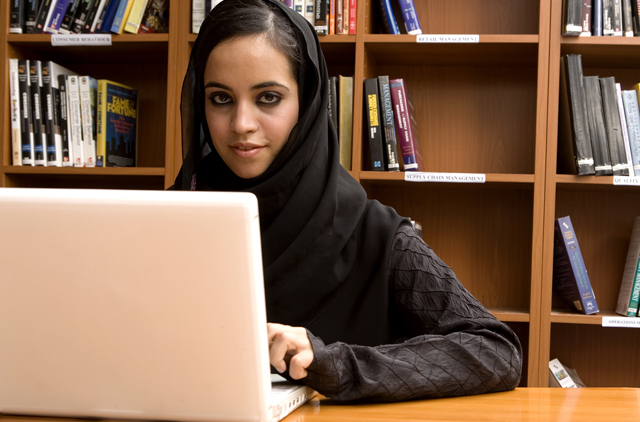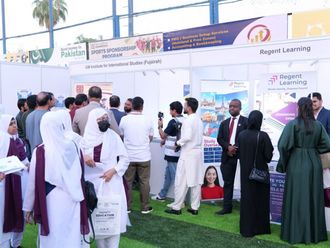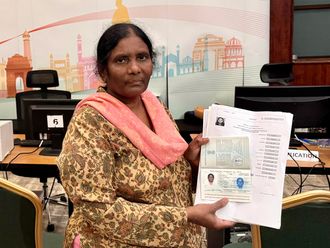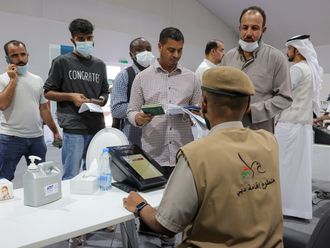Today more than 70 per cent of Emiratis in federal higher education institutions are women. While the female enrolment rates is outstripping that of males in the USA, the UK and Australia, in the Gulf, and in the UAE and Qatar in particular, there are more than three times the number of women than men in public universities. The reasons behind this trend are complex and not easily disentangled; they involve family, school and the state.
In a study I conducted in Ras Al Khaimah in 2007, roughly 20 per cent of parents had a primary school qualification or less. While this situation is changing, it has meant that many young people across the UAE have been the first generation to complete high school in their families. If their parents did not complete high school or go to university, they may have been unaware of the opportunities of sending their son or daughter to the college. As families with lower education levels are typically less affluent, young men from these families may have faced pressure to find work upon leaving school to contribute to the family income rather than to continue their studies.
Quality of the school
Another important factor affecting a young person's choice to go on to university is the quality of the school.
Girls outperform boys in the majority of Ministry of Education examinations and the CEPA English examinations. In addition, both the PISA (2009) and TIMSS (2007) results for Dubai found that Emirati girls outperformed or equalled Emirati boys in maths, science and literacy. Girls are also far less likely to drop out of school prior to completion, with rates around 2 to 3 per cent while rates for boys are upwards of 10 per cent.
Much of this, I believe, can be explained by the teachers. Studies from the USA have found that teacher quality is the single most important factor influencing student achievement and that in some cases it can even outweigh family factors.
In the UAE, girls are taught predominantly by Emirati women while boys are taught predominantly by expatriate teachers.
Without being able to comment definitively on the relative quality of male and female teachers, there are some important differences to note that may affect teachers' engagement in class.
The first is that Emirati teachers are, like their students, citizens of the UAE.
A study on student achievement in China found that students taught by teachers from the same village did better than those taught by a teacher from another village or city. While it is difficult to say exactly why this is so, perhaps having shared experiences and cultural or social references make teaching and learning easier or more fluid. It could also be that there is a shared sense of nation building and that educated Emirati teachers are positive role models to aspire to. This is evident in the KHDA school inspections in Dubai, where government girls' schools consistently outperform government boys' schools.
And schools' ethos are vastly different in boys' and girls' schools. In my 2007 study I found boys' schools had more discipline problems, more graffiti, and less student involvement. Girls' schools, by contrast, were well taken care of, had fewer discipline issues and many had student councils. When coupled with an absence of career counselling about post-school educational opportunities, boys are left further behind than girls and the question becomes less about why there are so many females in higher education but more about how any males make it at all.
Role of the society
Finally, society and the state play a significant role in the decision of many girls to pursue higher education. Women in the UAE, despite their education levels, will face higher unemployment rates than men. Young women do not have the same opportunities for public sector employment young men have, due to a number of factors. Young women are less mobile, they typically need to work near their family and as such cannot commute for work to other emirates or to faraway locations.
In addition, there are few low-skilled jobs available for young women, such as those offered by the police or the military, which attract many young men. Once they marry and have children, they have fewer opportunities.
The bottom line is that family, school and the state play a crucial role. The family gives young women an environment that encourages their education and offers limited distractions, the school offers a nurturing environment and positive role models, and the state through a shortage of public sector jobs for women in general signals that without adequate education finding employment will be very difficult.
All these factors combine to create a system in which young women are actively continuing their education but where young men are still failing to see the point of it. It is not enough, however, to get more young men into higher education. The domestic higher education sector itself also needs a drastic overhaul in terms of its quality and the courses that are on offer.
If this does not happen, both young men and women will be at a disadvantage when it comes to finding employment in an increasingly competitive labour market.
For expat students
For expatriate students living in the UAE, the situation is dramatically different than Emiratis. As both young men and women will be either entering the highly competitive local or international labour markets they realise that education is key to their future success.
For young male expats, there is the added incentive that they cannot stay on their parents' visa once they turn 18 and are thus compelled to either study or find work. So there is a significant demand by the majority of young, expatriate, high school graduates for higher education and as a result the UAE has seen an explosion in the number of private higher education institutions catering to all income levels and nationalities.
A growing and interesting trend is for young less well-off Arab expats to attend Indian universities, both due to the low fees charged and in order to improve their command of English. However, there are concerns about the legitimacy of some of these institutions, with some not being accredited, some closing abruptly and holding on to students' fees and others simply offering a very poor quality of education. The issue of quality assurance in the private higher education market is critical; students and their families must be very careful in selecting institutions accredited by the Ministry of Higher Education and Scientific Research and/or by the home country's accreditation authority.
— The author is the Director of Research (Acting) for Dubai School of Government













